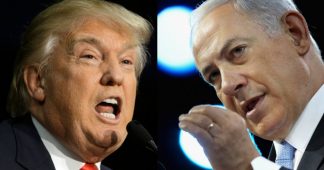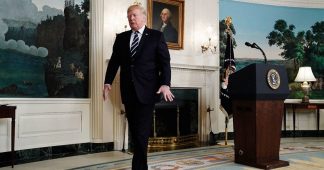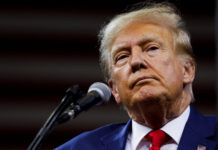By Boris Kagarlisky
One of the most prominent election advertisements of Donald Trump’s campaign called on voters to “join the revolution”. Of course, in the context of American political rhetoric, anything passes as a “revolution”. However, many of Trump’s appeals indeed sounded extremely radical and resembled more the demands of the left than the usual agenda of Republican politicians in the United States. This radical rhetoric included calls to fight the Washington establishment, protect industrial production, increase the incomes of workers and put an end to the neo-liberal policies of the free trade that led to the destruction of millions well-paid jobs and loss of a significant portion of social gains of the democratic West. This rhetoric mobilized the working class voters, the provincial middle class and small businesses, and enabled Trump to enter the White House.
A year later, one can say that these promises have not been fulfilled, and the expectations of the majority of Trump voters are betrayed. In fact, Trump’s government turned out to be quite an ordinary republican administration, only less competent and less stable than the previous ones. It is significant that as the ineffectiveness of the new president becomes more apparent, the scandal around him subsides. The worse job the White House does the weaker and less frequent calls for impeachment become. There are no more mass demonstrations aiming to overthrow the president who have used politically incorrect expressions. The degree of Trump hatred have subsided in the liberal press. He now rather evokes laughter than anger. The liberal establishment has achieved its goal without resorting to radical means. Those who would like to preserve the political system the way it is do not need its destabilization. Rather, it could be the last argument of the oligarchy if it was losing its positions. However, there is no need for such argument; the power of the oligarchy has not been challenged. The tax reform carried out by the republican congress became a kind of a final line drawn under the debate. Candidate Trump did not say anything definitive about the issue of taxes, but the reform is fully in line with the traditional agenda of the conservative wing of the Republican Party. Trump supported it, and now it is associated with his name. In other words, the Republican Party coup did not take place; there will be no return to the times of Abraham Lincoln.
Trump did not start a conflict with the Congress, and now works constructively with the Republican majority – the one that fought him during the 2016 primaries. He reneged on his promises, including the scandalous promise of wall construction on the border with Mexico. A year has passed, but the wall is not there. The reform program is curtailed, while the president plays golf. Nothing has radically changed in the foreign policy as well, except for a few extravagant tricks like recognizing Jerusalem as the capital of Israel (plunging the Israelis into confusion). Even US withdrawal from the Paris protocol on cutting CO2 emissions can hardly be called a radical gesture – republican administrations have never been enthusiastic about the EU’s environmental programs. The expectations of workers who pinned their hopes of social change on Trump, and the apocalyptic forecasts of the liberals were never fulfilled. Business as usual rules in Washington.
It is easy to explain away this failure by the personality of the forty-fifth US president, an emotionally unstable person, a leader without strategy who exhibits confused and conflicting views, lacks his own team and political experience. However, would it be complete and satisfactory explanation?
The failure of Trump’s substantive agenda can be fully explained only through the prism of class contradictions within his electoral coalition. The ideology of the right-wing populism bears in itself an unsolvable contradiction between the promise of social change in favor of the working people and the intention to preserve the economic foundations of the system. According to this ideology, the structure of the dominant interests within the society cannot be radically changed. It calls for mere changes in policies, for the removal of the “bad elite” from power, while leaving the position of the ruling class unchallenged. Such approach reflects the contradictions and conflicts within the ruling class itself, but the trouble is that the conflict cannot be resolved within this system, within this class, without major changes that require participation of completely different social and political players.
Financial capital and the Washington establishment can triumph: an incompetent president plays golf; the hindrance on the right is eliminated. However, the problems that exist both in the American society and in the world economy have not disappeared. They remain just as serious. The social crisis continues to exacerbate. If Trump does not manage to solve the problems, then someone else will have to take up this task. The defeat of the right-wing populism, which became a fact in the United States in 2017, opens the prospect for a new upsurge of the leftist movement. It is no accident that despite his defeat in the presidential race, indecisiveness and inconsistency, Bernie Sanders has become the most popular politician in America.
The question remains whether the American and Western left wants to learn from the events of the past two years, and whether it will be able to develop a political platform based not on liberal rhetoric and politically correct discourse but on the class interests of working families. Even more pressing question is whether the leftists are ready to struggle for power or they still prefer to enjoy their pleasant and comfortable position within the framework of radical subculture.











